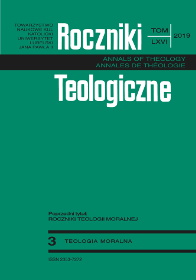“Castitas” at Augustin of Hippo
Abstract
In his works De continentia, De bono conjugale and De «Santa virginitate» Saint Augustine of Hippo defends “castitas” ridiculed by pagans. He does not try to define a clear border between “castitas”, “pudicitiam” and “continentia”, though. He understands “castitas” as a virtue allowing to resist bad lust. Furthermore, being closely related to the virtue of moderation, “castitas” determines the quality of relationship between husband and wife also helps to maintain marital fidelity. St. Augustine does not treat ethical issues as superior ones in his works. He examines a man as a creature endowed with a sex drive that is to find inner unity “lost” through the original sin. Purity is the very privileged element that participates in the reconstruction of this unity: between spirit and body and between creation and the Creator. “Castitas” is then the virtue of “animus” (internal man) who maintains moderation in sexual relationships and is able to resist unsettled sex drives. Augustine does not bring down “castitas” only to the effort of human will, as Pelagius would. He admits that the hardest fight of a man is securing a clean life, as it requires a daily fight, and victory is really rare, all with the power of God. There are two desires: the good and the bad one. The latter is often out of control. Thus people must constantly fight. Good lust is needed for the survival of a mankind. It is worthy only when “used” in a marriage.
The man who follows evil lust loses the “castitas” and therefore turns away from God.
References
Brown P., Le renoncement à la chair, Paris, Gallimard, 1988.
Saint Augustin, De civitate Dei.
Saint Augustin, De nuptiis et concupiscentia.
Saint Augustin, «Les confessions», dans Œuvres de Saint Augustin, édition Desclée de Brouwer et Cie, Bibliothèque augustinienne, 1949.
Saint Augustin, «De continentia», dans: Œuvres de Saint Augustin, édition Desclée de Brouwer et Cie, Bibliothèque augustinienne, 1949.
Saint Augustin, «De sancta virginitate», dans: Œuvres de Saint Augustin, Paris, édition Desclée de Brouwer et Cie, Bibliothèque augustinienne, 1949.
Copyright (c) 2019 Roczniki Teologiczne

This work is licensed under a Creative Commons Attribution-NonCommercial-NoDerivatives 4.0 International License.





